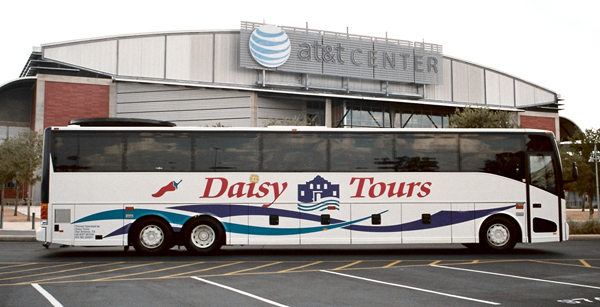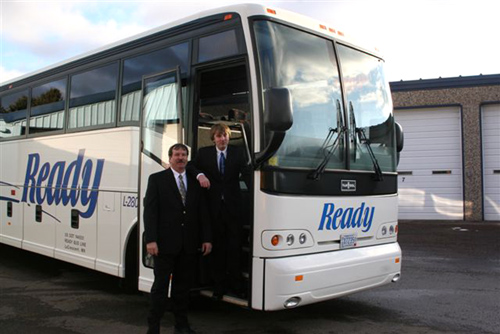Members of family-owned motorcoach companies say seamless transitions require respect, communication and planning
By Bethanie Hestermann

The motorcoach industry is peppered with proof that family-owned and operated businesses can take management transitions in stride. There may be differences in management styles and temperaments, advances in technology and the changing face of today’s economy to contend with, but with proper steps and a little planning, the process can strengthen both the company and the family.
Motorcoach operators are quick to point out the benefits of keeping a bus company in the family. For one, each person involved — whether parent, child and grandchild; brother, sister or second cousin — has a vested interest that runs much deeper than their pocketbooks.
“The business always reflects back on the family,” says June Bratcher, CEO who founded Daisy Tours, San Antonio, TX, in 1980. “When it is your name on the back of those buses, each person who shares that name is very interested in making sure the operation runs smoothly because they will each be affected by the outcome.”
Pride in ownership
It was on the golf course that Bratcher’s two sons, Daniel and David, decided to suspend their individual careers to heed their mother’s call and join the family business. One year into their predetermined two-year trial period, the boys decided they loved the company as much as their mom did and opted resoundingly to stay.
Today Daisy Tour management comprises of David, president, and Daniel, vice president, who operate under the close eye of June — who has been “reduced” to CEO and founder. Her two daughters, Beth and Kim, also help run the company by lending their talents, experience and ideas to the collective Bratcher brain trust. Bratcher says she is slowly relinquishing control but plans on staying a few more years to make the shift as smooth as possible.
For the Bratcher family, the most difficult part of the transition so far was the technology gap between the two generations.
“As good of a job as mom had done in the past, we had sales figures in the seven digits and still did everything on paper,” says David Bratcher. “It was the department of redundancy department, because we had to file everything in four different places.”
So, the Bratcher sons’ first mission as next-generation management was to drag their mom, kicking and screaming, into the 21st century.
“It was hard for me,” says Bratcher. “I thought we would lose track of everything and everybody. But the business we started in 1980 is not the business we have today. I knew if we didn’t move in the same direction as the rest of the world, we were not going to grow.”
Techniques versus principles
Duane Spader, with 30 years of experience leading Spader Business Management, can authoritatively state that if certain aspects of an operation do not change with the times, the business will stagnate or not survive at all. Incoming management should prepare to “pick your battles” and accept compromise. Outgoing management should not be insulted by change or innovation.
“In today’s world the only certainty is that nothing remains the same,” says Spader. “While rapid change is routine for young people, founders are not always open to the technological revolution.”
But according to Spader, one of the most important things to keep in mind is the distinction between techniques and principles.

“To stay with the same techniques as the founders is not the answer, but to stay with the same principles is critical,” he says. “A successful company abides by a set of documented principles that do not change between generations.”
Ready Bus Lines, La Crescent, MN, operates on some key principles that will be preserved as long as a Ready is at the helm. Tom Ready, current owner, took over from his father who founded the company in 1952. His son Dayton, now in 11th grade, has also shown interest in the family business.
Ready inherited the motto work before pleasure from his father — an adage that speaks to the fact that in a family business, work is home and home is work. If Dayton chooses to follow in his footsteps, Ready will also pass on the importance of respecting workers, good networking between vendors, suppliers and contractors, and the recognition that running a bus company is a commitment that takes hard work but reaps plenty of rewards.
“You work hard to keep your company name proud,” says Ready. “My dad worked hard, I work hard and you want that to be carried on. Family business is about preserving your name and reputation; customers will recognize that and your employees will respect it.”
Ready says successful transitions demand tolerance, openness to new ideas and flexibility from both sides. He believes humbleness about your own abilities and limitations can help a manager through a transition.
“If someone tells me they can do it better, I’ll always listen,” he says. “Because I’m thinking, well maybe I don’t know everything.”
Just like any transaction, the goal in a management transition is to make sure all parties are happy with the result. Spader says a family business is a balancing act. Business needs, family needs and personal needs must be blended together, and none can be ignored.
Early planning pays off
Those who begin the process well before the older generation retires will be better off, Spader says. A written plan also goes a long way towards a smooth transition.
“The primary advantage to a written plan is not so much to follow, but to force the thought-process that will help clarify issues you need to talk about beforehand,” says Spader.
Ralph Young, chairman of Young Transportation, Asheville, NC, says a key to a seamless transition is that everyone understands and feels at ease with the role they are moving into. Young is well into the process of turning Young Transportation over to his nephew, Tom Crouch, who serves as president, and Hank Garbee, Young’s son-in-law who serves as vice president.
“In my mind this transition started 10 years ago,” says Young. “When my son-in-law started working for me I started watching, observing and getting comfortable with the idea.”
The transition officially began five years ago and will come to a head later this year. The length of the process enabled Young and his successors to become acclimated with their respective roles. He says the biggest hurdle they faced was getting to this level of comfort.
“We needed to talk, talk, talk — about the future, the past, what we did wrong and what we right. Everyone needed to get totally comfortable with the situation,” he says. “It’s a long process, but it’s a labor of love.”
Family-run operations are not unique in the motorcoach industry; there are countless examples. Each faces its own set of challenges but all have one thing in common: the family business is more than a livelihood — it is a legacy and an heirloom. BR
